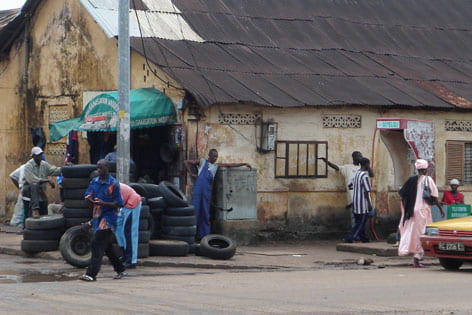UCI Africa Initiative lends a hand
UC Irvine group demonstrates how modest efforts can reap big rewards by donating time and energy in Africa.

People in Africa suffering from malnutrition and disease will receive vitamins and wheelchairs thanks to a new UC Irvine group headed by neuroscientist Hans Keirstead.
The UCI Africa Initiative aims to raise awareness about how small gestures can have a huge effect on Africans’ lives. Formed in late April, the group includes participants from Student Affairs and the School of Medicine.
“It’s amazing how little you have to do to have a large impact in Africa. I think more people would help if they knew how easy it is,” said Keirstead, co-director of the Sue & Bill Gross Stem Cell Research Center and faculty member of the Reeve-Irvine Research Center, which seeks treatments for spinal cord injuries.
The initiative builds upon Keirstead’s personal connection to Africa. In 2006, he was appointed vice chancellor of UDECOM, a private university in the Republic of Guinea, in West Africa. His father, Kenneth Keirstead, is founder and director of The Lyceum Group, an education and healthcare organization active in West Africa.
In early May, the UCI initiative shipped to Guinea 2,000 pounds of vitamins donated by Thomas Tierney, former chairman of the University of California, Irvine Foundation. Tierney heads Tustin-based Vita-Tech International Inc., a vitamin manufacturer.
Later in May, initiative member Manuel Gómez, UCI vice chancellor for student affairs, attended two conferences on Africa in Dakar, Senegal: eLearning Africa 2009 addressed how electronic learning (cell phones, computers, etc.) can benefit people in developing countries, and the Forum for Education in West Africa focused on education challenges in poor nations.
“Technology has collapsed distances and broken down borders in extraordinary ways,” Gómez said. “I’m interested in learning and seeing what impact the Internet and cell phones are having on rural Africa.”
UCI organizers want to start an exchange program in which UCI students and faculty would travel to Africa, and Africans would come to UCI to learn and take home with them information, new skills and contacts that could better their lives.
Said Gómez: “We want our students to know the world, and we certainly want the world to know our students.”
Later this year, the UCI group will ship 550 wheelchairs to disabled people in Africa. About 300 will go to residents of The Polio Home, a Guinea facility for polio victims established by The Lyceum Group. The Irvine-based Free Wheelchair Mission, headed by Don Schoendorfer, donated the wheelchairs.
Joining Keirstead and Gómez in the UCI Africa Initiative are Nancy Minear of student affairs, medical students Andrew Eads and Rod Mortazavi, and undergraduate Colby Dong Vongchaichinsri.